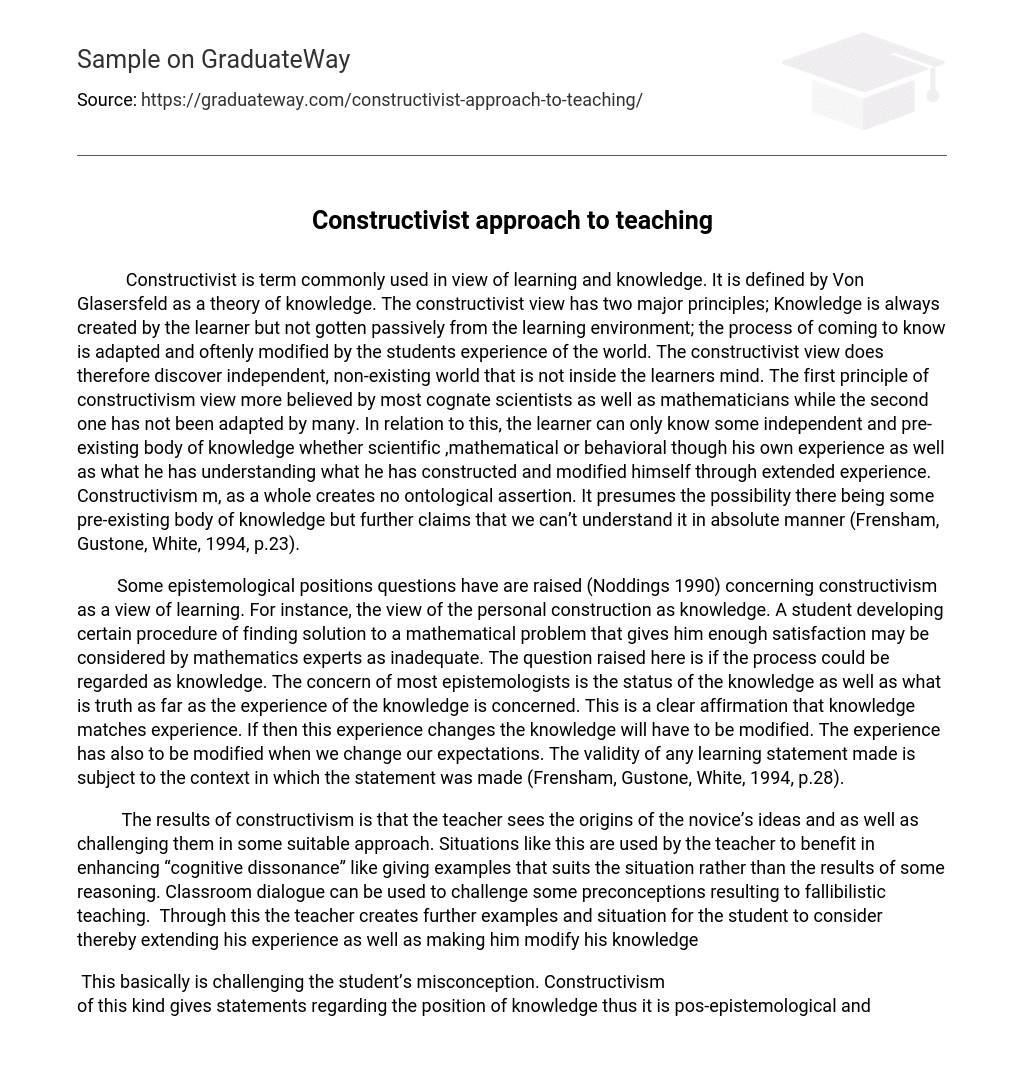Constructivist is term commonly used in view of learning and knowledge. It is defined by Von Glasersfeld as a theory of knowledge. The constructivist view has two major principles; Knowledge is always created by the learner but not gotten passively from the learning environment; the process of coming to know is adapted and oftenly modified by the students experience of the world. The constructivist view does therefore discover independent, non-existing world that is not inside the learners mind. The first principle of constructivism view more believed by most cognate scientists as well as mathematicians while the second one has not been adapted by many. In relation to this, the learner can only know some independent and pre-existing body of knowledge whether scientific ,mathematical or behavioral though his own experience as well as what he has understanding what he has constructed and modified himself through extended experience. Constructivism m, as a whole creates no ontological assertion. It presumes the possibility there being some pre-existing body of knowledge but further claims that we can’t understand it in absolute manner (Frensham, Gustone, White, 1994, p.23).
Some epistemological positions questions have are raised (Noddings 1990) concerning constructivism as a view of learning. For instance, the view of the personal construction as knowledge. A student developing certain procedure of finding solution to a mathematical problem that gives him enough satisfaction may be considered by mathematics experts as inadequate. The question raised here is if the process could be regarded as knowledge. The concern of most epistemologists is the status of the knowledge as well as what is truth as far as the experience of the knowledge is concerned. This is a clear affirmation that knowledge matches experience. If then this experience changes the knowledge will have to be modified. The experience has also to be modified when we change our expectations. The validity of any learning statement made is subject to the context in which the statement was made (Frensham, Gustone, White, 1994, p.28).
The results of constructivism is that the teacher sees the origins of the novice’s ideas and as well as challenging them in some suitable approach. Situations like this are used by the teacher to benefit in enhancing “cognitive dissonance” like giving examples that suits the situation rather than the results of some reasoning. Classroom dialogue can be used to challenge some preconceptions resulting to fallibilistic teaching. Through this the teacher creates further examples and situation for the student to consider thereby extending his experience as well as making him modify his knowledge
This basically is challenging the student’s misconception. Constructivism
of this kind gives statements regarding the position of knowledge thus it is pos-epistemological and is a theory of knowing more than theory of knowledge.
Constructivism on the other hand creates the problem especially when the teacher expects the learner to have some sense in his means. The student’s creation which is meaningful to themselves might not be enough for the bigger contexts that the teacher has. This has the challenge of whether there is compatibility of knowledge between the participants in the teaching environment hence the issue of how close the conceptions of the different participants.
Learning is therefore seen as an individual creation and social mediation of knowledge in the society of practice while knowledge is viewed as an action taken by the student but not gotten from outside. Learning involves compari9ng new experiences with knowledge from previous experiences (Frensham, Gustone, White, 1994, p.67).
Reference
Fensham Peter, Gunstone Richard & White Richard (1994). The Content of Science: A Constructivist Approach to Its Teaching and Learning. New York: Blackwell Publishers, pp.23, 28, 67





